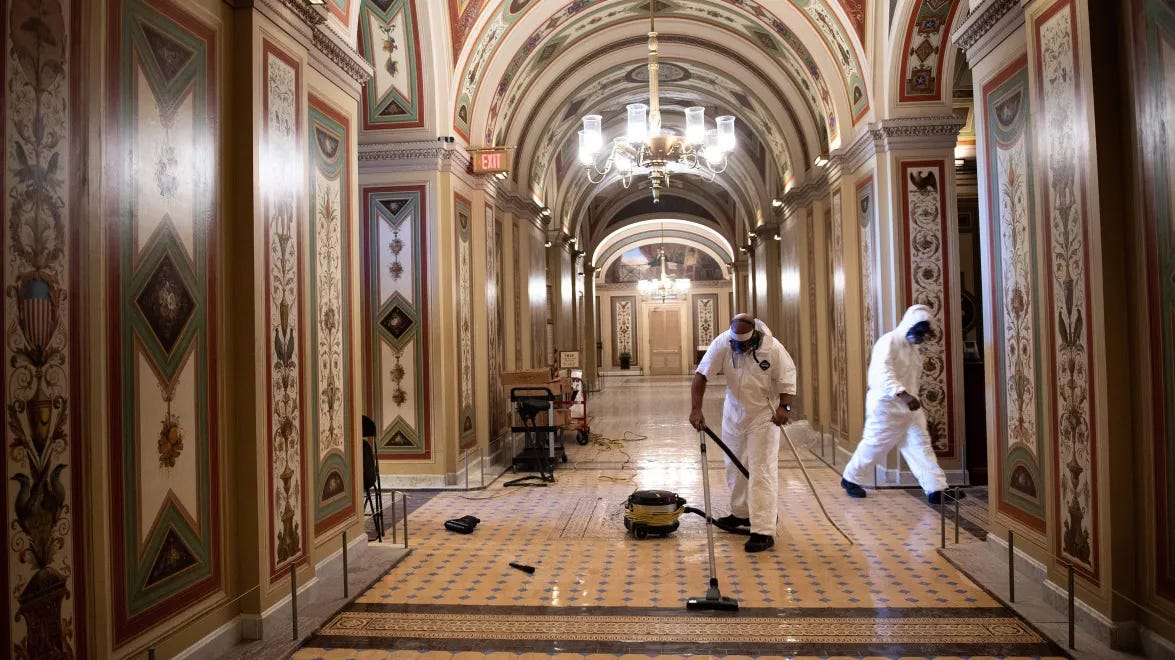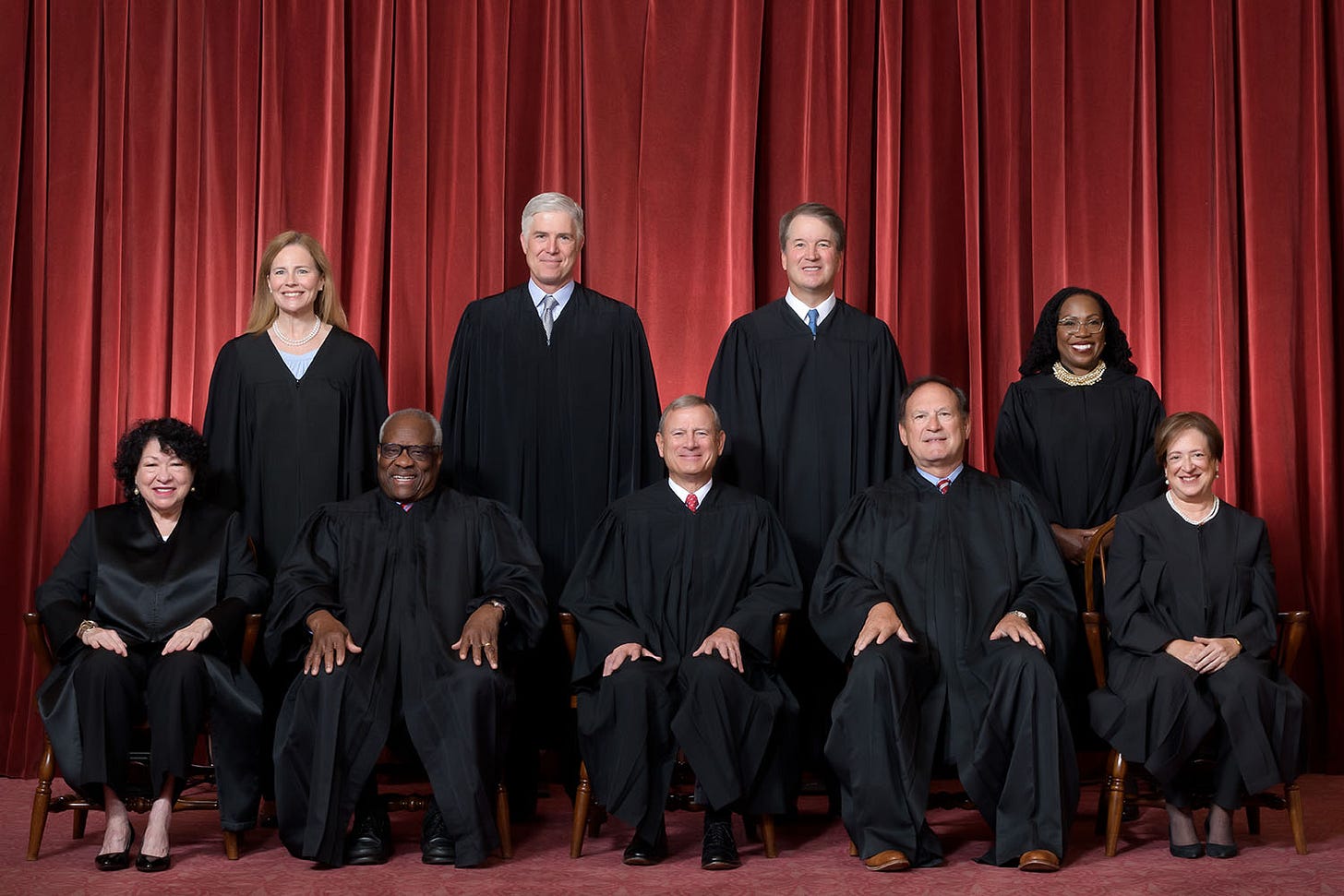For Thee, But Not For Me
The Supreme Court and its (lack of?) ethics
If you’re new here, hello and welcome. I am a longtime government and law teacher.
I once had a student’s parents present me with a gold necklace as a kind gesture. They were from a culture where teachers were revered, and a piece of gold jewelry was a way of saying, “Thank you for helping my daughter learn.” (Their child was an A student; this was no attempt to bribe me for a better grade.)

I felt terrible that I had to decline the gift, because I could not accept anything valued at greater than $20. My student’s parents asked if they could come speak to me after school, because they wanted to convey that they weren’t trying to do anything inappropriate by offering me a token of their esteem. I spoke with my principal in advance of the meeting, and he sympathized, but told me I would be in violation of my contract if I accepted the gift.
I let the parents down as gently as I could. “It’s such a beautiful necklace, and I am so grateful you thought of me, but I could risk my job if I take it,” I told them. They understood, but I will never forget the image of my student’s mother putting the gift back in her purse dejectedly.
In January 2021, after the attack on the US Capitol, I was struck by a phrase I heard on the news: “The Capitol is now being cleaned so Congress can return.” I thought, It is literally someone’s job to clean up the broken glass, the feces, and trash so we can have democracy.
Shortly thereafter, I mounted a letter writing campaign to say thank you to the men and women of the Architect of the Capitol’s office. Thousands of people from all over the country sent cards. Classrooms of second graders wrote thank you notes. I was interviewed on multiple news outlets around the country.
The Architect of the Capitol put together a magazine of some of the many thousands of pieces of mail that were received and sent it to their staff members, so they would know the vitally important role they play in democracy.
Before I encouraged people to send anything, I spoke with administrators to shore up the logistics. “Can people send gift cards if they want to convey their thanks?” I asked. “No,” I was told, over and over. “There are very strict federal guidelines about accepting gifts. Employees can’t accept a gift worth more than $20 per occasion, and it’s likely that this would be viewed as a single occasion, even if the gifts came from different sources.
So we sent our thanks. But not our gifts.
Most government employees have stringent rules they must follow to ensure that there is no undue influence. Members of Congress are restricted to a $50 limit.
But the Supreme Court? Not so much.
In one news story after another, we keep hearing about the gifts of travel some members of the court have accepted without reporting. Trips on private jets. Stays at private lodges. Yachting in Indonesia with private chefs. Safaris. Fly fishing. Jaunts to the secretive Bohemian Grove.
Clarence Thomas said the fact that they were not reported was a “misunderstanding of the filing instructions.”
ProPublica estimates Clarence Thomas has received over $4 million in gifts during his time on the high court.
Samuel Alito did not declare the gifts he received from billionaire Paul Singer, who had business before the Court. Nor did he recuse himself from the case.
I tapped Steve Vladeck, a UT-Austin law professor, CNN contributor, and author of the fantastic newsletter One First, to answer two questions that I’ve been hearing from so many of you.
Does the Supreme Court even care that they are ruining their credibility?
Steve said, “It certainly seems to me that a majority of the justices care deeply about the Court’s credibility…How else to explain the Court’s adoption, just seven months after the first ProPublica reporting about Justice Thomas and Justice Alito, of a Code of Conduct? That (less-than-half-) measure may not have been sufficient, but it certainly speaks to a Court that felt that it had to do something. It’s worth taking a beat to reflect on what it means that the Court felt that pressure.”
I get Steve’s point. If Chief Justice John Roberts didn’t care at all about what the rest of the country thought, he could have continued to maintain the status quo with next to no repercussions.
Steve continued:
“Even the justices less interested in how credible the Court is among its critics almost certainly still care about the Court’s credibility among its supporters. What I worry that those justices miss is that, when things hit the fan, a Court that has credibility with only one chunk of the population is going to have a heck of a time handing down decisions that are broadly unpopular with its fans—who will point to the Court’s eroding credibility as reason why they, too, shouldn’t follow the justices.”
In other words, support for the Court, whether it comes from the left or the right, isn’t a guarantee. And when you make it easy for your supporters to find a reason to discredit what you do, that’s a problem.
Steve gave this example:
“In January of this year, when a 5-4 Court ruled that the federal government could continue to remove razor wire that Texas Governor Greg Abbott had placed along the U.S.-Mexico border— Rep. Chip Roy (R-Tex.) went on Fox News to urge Governor Abbott to defy that ruling. That’s why it’s so important, in my view, for the public discourse to be about why eroding credibility is not just about Democratic hostility to the Court—but about the Court’s ability to do anything besides follow the political tides.”
So what’s the answer? Should justices be subject to the same ethics rules as the rest of the federal judiciary, and in fact, government employees at large? Building services workers at the US Capitol would be summarily fired for the gifts Thomas and Alito have accepted. I would have been in violation of my teaching contract had I accepted a trip on a superyacht. Or even a $25 necklace.
Steve has a different take:
“The justices should be subject to the same financial disclosure rules as their colleagues on the federal trial and appellate courts. And I think they should largely be subject to the same ethical rules—with two exceptions.
“First, I agree that there are contexts in which the justices should not have to recuse even if a lower-court judge would have—because there is no mechanism to replace that justice on the Court. That’s not an argument for no recusal rules; just ones that lean slightly against recusal in marginal cases.
“Second, I also believe that the Constitution would bar Congress from subjecting the justices to some of the same disciplinary mechanisms that currently apply (with some… inefficiencies) to lower-court judges. If Congress gave some body, or group of people, the power to act against the Court, then the Court wouldn’t be all that ‘Supreme’ any more.”
Steve thinks there’s a different approach. It involves more oversight, but not from a partisan Congress who cares about their political power and getting reelected.
He says there should be, “An Article III Inspector General who wouldn’t be able to take coercive action against the justices, but who would be able to carefully scrutinize (and report publicly on) their compliance with all relevant ethics and financial disclosure rules—a measure that should (1) deter misbehavior by justices who don’t want to be publicly shamed; (2) create a better record of misbehavior by justices who… have no shame; and (3) provide a source more official than a media outlet when it comes to documenting when the justices have crossed the line.”
Some members of Congress are feeling spurred to do something about the Court’s lack of public accountability and transparent ethics. “The highest court in the land should not have the lowest ethical standards,” Senator Dick Durbin said when he introduced an ethics bill recently.
Durbin said that the Supreme Court had “squandered” its unique power in the federal government.
But other senators blocked the bill from advancing via unanimous consent, with Senator Lindsey Graham calling it an attempt to undermine the Supreme Court.
This is simple, but not easy. This is not partisan, this is principle: the Supreme Court is highly dependent on the appearance of legitimacy in the eyes of the public. They have no police force to carry out their rulings. To continue to erode their public trust will mean a continued degradation of the rule of law, which is the cornerstone of any democracy.
As John Adams once said, we are a government of “laws, not of men.” And it’s time to shore up our democracy to better reflect that.
Thanks for reading today. I’d love to hear from you — feel free to leave a comment here. What do you think the answer to the quandary of Supreme Court ethics is?
I don’t have investors or work for a news organization. My work is supported by you. The best way you can ensure that you’ll see more valuable pieces in the future is to subscribe today.






Am I wrong to think that many of the problems within the federal government come from a Congress that has abdicated its responsibility because they are too busy trying to protect their jobs? It is in Congress that the Constitution offers a check on a badly behaving SCOTUS. Polarization means the parties won't play nice, leading to the latest Congress's "do nothing" record and, in this case, resulting in an unwillingness to hold unethical justices accountable. Impeachment is the check in our balanced three-part government, but when the body with the power to check refuses to, unethical behavior is allowed to continue. (When impeachment becomes a partisan revenge tool against the executive branch, that too is a problem.)
Another source of these problems appears to be a lack of character among the justices who just don't care that their behavior is eroding the public's trust in SCOTUS. Another instance of putting self over country. It's frustrating, and it's dangerous.
Thanks for this topic today. As a recently retired Federal Employee of 34 years, you state my concerns and frustrations perfectly. We were once gifted three pies at the office I worked in for providing outstanding customer service to our community, I felt the need to check to see if we could accept them because of the limitations set forth. And through many training sessions in ethics, we were constantly reminded that it is also the *appearance* of our actions that had to remain above board. It is incredibly frustrating to see the lack of ethical behavior from SCOTUS when they should be setting the bar for all Federal employees and citizens.